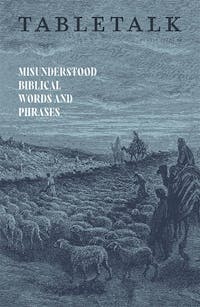
Request your free, three-month trial to Tabletalk magazine. You’ll receive the print issue monthly and gain immediate digital access to decades of archives. This trial is risk-free. No credit card required.
Try Tabletalk NowAlready receive Tabletalk magazine every month?
Verify your email address to gain unlimited access.
What is this place called Sheol for the Old Testament saint? In most Old Testament references, “Sheol” is used to describe human fate. A pallid aura hovers over the concept. Sheol is often described by the righteous as a place that one does not want to go to—an “unwelcome fate,” such as in Psalm 30:3. Often, when the psalmists refer to Sheol, what they most feared was not death per se, nor that they might lose themselves in death. Rather, they feared that they might lose contact with God. For example, Psalm 6:5 says, “For in death there is no remembrance of you; in Sheol who will give you praise?” The number of words for this place of the dead is striking in the Scriptures: “Sheol,” “pit,” “grave,” “depths,” “place of perdition,” “land of oblivion,” “Abaddon.”
Sheol was often thought of as a place of divine punishment, a destiny often wished on the ungodly. The psalmist often speaks in a metaphorical manner about Sheol. Sometimes “Sheol” is used to metaphorically describe the strength of affliction by someone who is not literally in Sheol. For example, in Psalm 88, the psalmist cannot literally reside in Sheol, because clearly he is still alive; therefore, he is using metaphorical language to describe his existence as if he is already in the realm of those who dwell in Sheol. Sometimes “Sheol” is used to describe the pain of being in exile. Sometimes “darkness” is used as a metaphor for a Sheol-like state, as in Psalm 143:3: “For the enemy has pursued my soul, he has crushed my life to the ground; he has made me sit in darkness like those long dead.”
When the Old Testament saint invoked “Sheol,” or synonyms of it, what he most feared was absence from God’s blessing, for one can never be absent from God altogether. Psalm 139:7–8 affirms that God, according to His omnipresence, was there in Sheol as well.
Psalm 16 is usually described as a Song of Confidence or Trust. Psalm 16 is, of course, quoted in Acts 2:25–28, 31 and 13:35. In particular, Psalm 16:10—“For you will not abandon my soul to Sheol, or let your holy one see corruption”—seems to be a reference to immortality, the resurrection, and the afterlife. The same issue is raised in Psalms 17, 49, and 73. It is common to find in the scholarly literature the claim that the Psalter contains no significant discussion about the Hebrew conception of the afterlife. Most commentators prefer to see the references at the end of Psalm 16 as the psalmist’s praying that God will protect him from some untimely death. Another theory is that the “life” referred to in verse 11 is “eternal life” and that therefore this is a statement about the poet’s belief in immortality, hence Luke’s application of it to the resurrection. As Geerhardus Vos recognized, these words were correctly applied to the resurrection of Jesus by Luke (see Acts 2:25–28).

With the death, resurrection, and ascension of our Lord Jesus Christ, the understanding of death and the afterlife changed radically for the saints. Here it is important to understand our Lord’s seventh saying on the cross: “Father, into your hands I commit my spirit!” (Luke 23:46). This final saying was a statement of consolation and filial trust. It was an act of offering His human spirit to His heavenly Father (meantime, His divine nature remained united with His human nature, even as He lay in the grave; see Belgic Confession 19). By making this final statement on the cross, Christ gives us an affirmation of the uninterrupted life.
Stephen, the first martyr in the church, grasped the significance of this, for even as he was being stoned, he called on God to be his keeper and said, “Lord Jesus, receive my spirit” (Acts 7:59). The Apostle Paul also grasped the reality of the resurrected Lord and the afterlife, for realizing that Hosea 13:14 had now experienced its true fulfillment, he could declare, “O death, where is your victory?” (1 Cor. 15:55).
